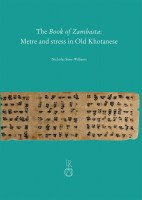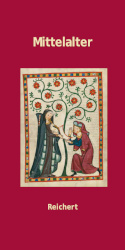Titelsuche
The Book of Zambasta
Metre and stress in Old Khotanese
Kurze Beschreibung
The nature of Old Khotanese metre has been a matter of controversy for more than a century. Nicholas Sims-Williams presents a new metrical analysis of the Book of Zambasta, the longest surviving Khotanese poem, arguing that the metre is based on the quantitative (moraic) principle, but with an obligatory ictus in the cadences which leads to the systematic lightening of certain unstressed syllables. The results shed light on the equally controversial issue of Khotanese accentuation and many other aspects of the language and its history. The book includes the complete text of the poem with interlinear scansion.„Ehsan Yarshater Book Award for Pre-Islamic Iran“ of the Persian Heritage Foundation (2023).
Ausführliche Beschreibung
Khotanese, a language belonging to the Iranian branch of Indo-European, which was spoken in the first millennium CE, has a rich literature including the Book of Zambasta, a poetic exposition of Mahāyāna Buddhism in 24 chapters. This poem makes use of three metres, whose nature has been a matter of controversy for more than a century. While its first editor, Ernst Leumann (1859–1931), regarded Khotanese metre as essentially quantitative (moraic) and derived it from a Proto-Indo-European metrical system supposedly reflected also in the Greek hexameter and the Middle High German Nibelungenlied, other scholars have understood it in very different ways: as a purely stress-based metre related to that of poetry in some other Iranian languages; as an adaptation of Indian metrics; or as representing a transitional stage from a quantitative to a stress-based system. The present work offers a closely-argued new analysis, demonstrating that the metre is indeed based on the quantitative (moraic) principle, but with an obligatory ictus in the cadences which leads to the systematic lightening of certain unstressed syllables. The results shed light on the equally controversial issue of Khotanese accentuation and many other aspects of the language and its history. The book includes the complete text of the poem with interlinear scansion. Additional fully searchable text-files available online make it possible for any reader to check the arguments and results.Autoreninfo
Nicholas Sims-Williams, born 1949 in Chatham, England, obtained his PhD at Cambridge in 1978 with a thesis on Christian texts in Sogdian. He joined the staff of SOAS University of London in 1976, becoming Emeritus Professor of Iranian and Central Asian Studies in 2015. He is a Fellow of several academies and similar bodies including the British Academy. In his research he focuses on the Middle Iranian languages of Afghanistan and Central Asia, taking an equal interest in the languages themselves, with their Indo-European roots, and in their Central Asian setting, with its stimulating mixture of languages, cultures and religions.Reihentext
The series Beiträge zur Iranistik was founded in the 1960s by Georges Redard and subsequently edited by Nicholas Sims-Williams from 1997 to 2020; the present series editor is Agnes Korn.
The series publishes works on the languages of the Iranian branch of Indo-European. The focus is on linguistics, including grammars, dictionaries, text editions, philology as well as diachronic and synchronic studies of linguistic topics. Neighbouring fields such as literature, archaeology and anthropology are likewise represented. The languages of the series are English, German and French. The Beiträge zur Iranistik are represented in libraries internationally and are widely used standard works of Iranian studies.
Verwandte Reihen:




 Vorwort
Vorwort

 Neuerscheinungen 2023/2024
Neuerscheinungen 2023/2024
 Gesamtverzeichnis 2023/2024
Gesamtverzeichnis 2023/2024
 Katalog Oriental Studies & Linguistics
Katalog Oriental Studies & Linguistics
 Mittelalter
Mittelalter
 Deutsche Inschriften
Deutsche Inschriften
 Musiktherapie
Musiktherapie
 Literaturen im Kontext
Literaturen im Kontext